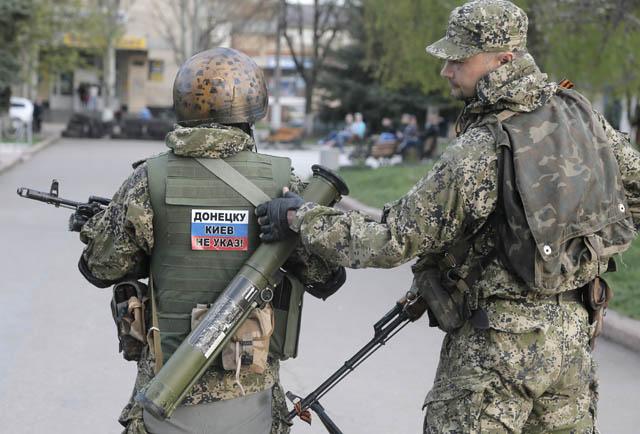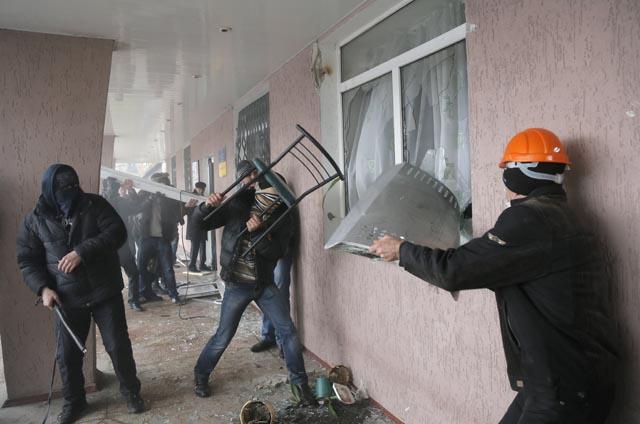You are here
High-stakes Ukraine talks open as Putin warns of ‘abyss’
By AFP - Apr 17,2014 - Last updated at Apr 17,2014
GENEVA — Russia and Ukraine sat down Thursday for Western-backed talks on the escalating crisis in the former Soviet republic as Russian President Vladimir Putin accused the authorities in Kiev of dragging the country towards the abyss.
In a dramatic worsening of tensions in the restive east, three pro-Moscow separatists were killed in an overnight gunbattle with Ukrainian troops in the southeastern port city of Mariupol.
The violence highlighted the urgency of the talks, which bring together the foreign ministers of Russia, the United States, the European Union and Ukraine, as scores of pro-Kremlin separatists Kiev says are backed by Moscow have taken over parts of the former Soviet republic’s southeast.
Russia, which has tens of thousands of troops stationed on its border with Ukraine, denies backing the militants and has warned Kiev not to use force against them, saying it reserves the right to protect the many Russian speakers in the country.
“Only through dialogue, through democratic procedures and not with the use of armed forces, tanks and planes can order be imposed in the country,” Putin said from Russia in televised comments timed to coincide with the start of talks.
“I hope that they [participants in talks] manage to understand towards what abyss the Kiev authorities are going, dragging with them the whole country.”
Kiev launched a much-hyped military operation against separatists earlier this week, but it ended in failure when the insurgents humiliated Ukrainian troops by blocking them and seizing six of their armoured vehicles, to the obvious joy of many of the Russian-speaking locals.
NATO promptly announced it was deploying more forces in eastern Europe and urged Russia to stop “destabilising” Ukraine, which has been in turmoil since the ouster of pro-Kremlin president Viktor Yanukovych in February and now threatens to split between its EU-leaning west and Russian-speaking east.
Decisive four-way showdown
The situation in Ukraine has emerged as the biggest East-West crisis since the end of the Cold War.
Each side comes to the talks armed with a very specific set of demands, in what is likely to make negotiations between Russia’s Sergei Lavrov, Ukraine’s Andriy Deshchytsya, US Secretary of State John Kerry and EU foreign policy chief Catherine Ashton very tough.
Washington and Kiev aim to get Moscow to demobilise the militias, and the United States warned Moscow on Wednesday that it risked fresh sanctions unless it made concessions.
But Moscow categorically denies having dispatched elite special forces to Ukraine to stir unrest, despite Kiev intelligence saying the same Russian agents who oversaw the seizure of Crimea last month are now coordinating the unrest in the southeast.
Instead, Russia blames Kiev’s interim leaders for pushing the country dangerously close to a civil war.
Moscow refuses to see Kiev’s government — installed by Ukraine’s parliament in February after the overthrow of Yanukovich following months of protests — as legitimate.
‘Consequences’ if talks fail
The United States and European Union have already imposed punitive sanctions on key Russian and Ukrainian political and business officials, including members of Putin’s inner circle.
But if the meeting ends in failure, Western countries are prepared to slap Moscow with tougher, broader economic and financial sanctions meant to hurt its already struggling economy.
White House spokesman Jay Carney said Wednesday that the United States was “actively preparing” new sanctions against Russia, with signs growing that Washington may be ready to target the country’s key mining, energy and financial sectors.
US President Barack Obama specifically accused Moscow of supporting separatist militias.
“Each time Russia takes these kinds of steps that are designed to destabilise Ukraine and violate their sovereignty, there are going to be consequences,” Obama told CBS News.
In the meantime, the situation on the ground in Ukraine continued to deteriorate.
In Mariupol, where the three separatists were killed, a further 63 were detained out of around 300 insurgents who attacked an interior ministry base using guns and petrol bombs.
The army unit that lost six armoured vehicles to militants on Wednesday was formally disbanded as Kiev’s military reeled from its disastrous attempt to oust separatists.
The events in Ukraine’s southeast are disturbingly similar to the situation in the Crimean peninsula before it was annexed by Russia last month.
In a statement on Thursday, Ukraine’s interior minister said Russian cell phones had been seized from some of the people arrested in Mariupol.
Related Articles
Russia was under US pressure Saturday to convince pro-Moscow rebels in Ukraine to cease occupying eastern towns, after Washington warned the situation in the former Soviet republic was in a “pivotal period”.
Pro-Russian insurgents gained more ground on Monday in Ukraine’s separatist east while Kiev’s Western-backed leader sought a way out of the crisis by proposing a referendum and seeking UN help.
Ukraine’s new Western-backed President Petro Poroshenko got down on Sunday to the Herculean task of pacifying a deadly pro-Kremlin insurgency and averting a devastating Russian gas cut.













